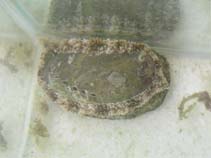Haliotis asinina Linnaeus, 1758
Donkey's ear abalone| Native range | All suitable habitat | Point map | Year 2050 |

|
| This map was computer-generated and has not yet been reviewed. |
| Haliotis asinina AquaMaps Data sources: GBIF OBIS |
Classification / Names Common names | Synonyms | CoL | ITIS | WoRMS
Gastropoda | Lepetellida | Haliotidae
Environment: milieu / climate zone / depth range / distribution range Ecology
Benthic; depth range 0 - 10 m (Ref. 349). Tropical
Distribution Countries | FAO areas | Ecosystems | Occurrences | Introductions
Indo-West Pacific.
Length at first maturity / Size / Weight / Age
Maturity: Lm ?, range 4 - ? cm Max length : 12.0 cm ShH male/unsexed; (Ref. 349); common length : 9.0 cm SHL male/unsexed; (Ref. 349)
Short description Morphology
Life cycle and mating behavior Maturity | Reproduction | Spawning | Eggs | Fecundity | Larvae
Main reference
References | Coordinator | Collaborators
Poutiers, J.M. 1998 Gastropods. p. 363-648. In Carpenter, K. E. and V. H. Niem. 1998. FAO species identification guide for fishery purposes. The living marine resources of the Western Central Pacific. Volume 1. Seaweeds, corals, bivalves, and gastropods. Rome, FAO. (Ref. 349)
IUCN Red List Status
(Ref. 130435: Version 2025-1)
CITES status (Ref. 108899)
CMS (Ref. 116361)
Threat to humans
Human uses
Fisheries: commercial
| FishSource |
Tools
More information
Max. ages / sizes
Length-weight rel.
Length-length rel.
Length-frequencies
Mass conversion
Abundance
Internet sources
BHL | BOLD Systems | CISTI | DiscoverLife | FAO(Publication : search) | Fishipedia | GenBank (genome, nucleotide) | GloBI | Gomexsi | Google Books | Google Scholar | Google | PubMed | Tree of Life | Wikipedia (Go, Search) | Zoological Record



